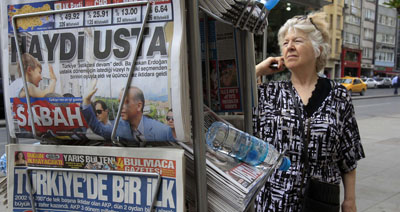This week I joined CPJ board Chairman Sandra Mims Rowe, Executive Director Joel Simon, and Turkish researcher Özgür Ögret in Istanbul to present CPJ’s latest report, “Turkey’s Press Freedom Crisis,” and convey our main press freedom concerns, including the mass imprisonment of journalists.
Released on Monday, October 22, the CPJ report made a splash in Istanbul and Ankara. Its main findings were on the front page of the muckraking daily Taraf and the Hürriyet/Daily News, commented upon in Today’s Zaman columns, debated on TV Habertürk and CNN Turk. Evoking the Turkish government’s use of tax laws to muzzle the media, a cartoonist with Cumhuriyet even imagined Turkey’s Finance Minister Mehmet Şimşek at the door of CPJ’s New York offices, asking for the organization’s accounting books.
The report, which concludes that at least 61 journalists are in jail for their journalistic work, directly challenges the Erdoğan government. The authorities contend that most of these prisoners are held due to their membership in forbidden organizations, either the ultra-nationalist clandestine network Ergenekon or the banned Kurdistan Workers Party (PKK). However, instead of immediately blasting the report, the authorities announced that they were crafting their response and would publish a statement in due time, after the Muslim Eid al-Adha holiday next week.
The CPJ delegation gave a cascade of interviews, met Istanbul-based foreign correspondents, and visited news media head offices. Most importantly, we talked to the journalists who were victims of the waves of arrests ordered by the government.
We held long discussions with two of Turkey’s most prominent investigative journalists, Nedim Şener and Ahmet Şik, who spent months in prison on charges of membership in the Ergenekon conspiracy and are still awaiting trial. We also heard the editors of two of the Kurdish media most affected by the arrests, the Dicle News Agency (DIHA) and the daily Özgür Gündem.
In the highly charged Turkish political context, our delegation constantly strived to emphasize that our approach is not ideological nor partisan: our statistics are the result of a thorough and impartial review of all the cases and our call for the liberation of journalists is based on Turkey’s own commitment as a member of the Council of Europe to respect the European Convention of Human Rights.
Some Turkish commentators appeared incensed by figures that classified their country as the world’s worst jailer of journalists and they complained that Turkey–with its diverse, boisterous, and vibrant media–could not be compared with Iran, Eritrea, or China, three countries that are undoubtedly not free.
But that was indeed the point made by our delegation. Turkey, a member of the Group of 20 leading economies and an increasingly active diplomatic player, is a country with ambition to be a model of modernity in the region. This objective cannot be attained, we emphasized, if Ankara maintains a legal system studded with vague clauses and harsh sentences that institutionalize arbitrariness and chill freedom of expression, the crucial pillar of a mature democracy.
A second CPJ delegation is expected to visit Ankara early next month in order to meet with government officials, discuss the findings of the report, and advocate not only for the release of the journalists but also for a fundamental overhaul of Turkey’s legal system in line with international press freedom and human rights standards.
[Reporting from Istanbul]
